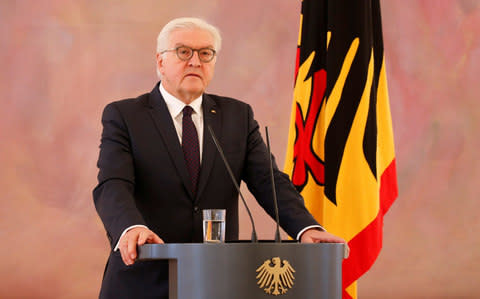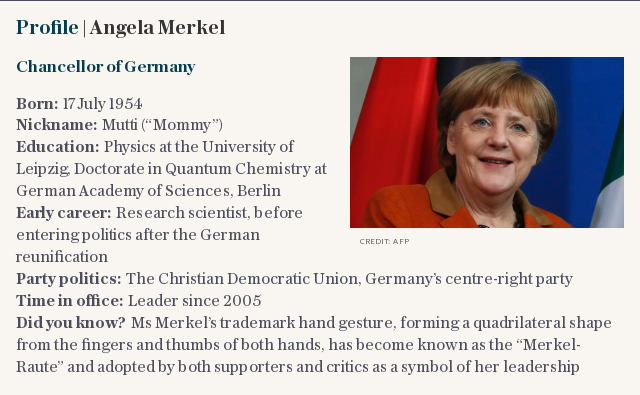German president holds talks with party heads in bid to steer country to stability

The German president held talks with the heads of political parties on Tuesday in a bid to end the crisis over forming a new government and avert new elections.
President Frank-Walter Steinmeier met with Christian Lindner, who pulled his Free Democrat Party (FDP) out of coalition talks with Angela Merkel at the weekend, in an effort to persuade him to return to the negotiating table.
In an interview with a German newspaper released shortly after spending one hour with the president, Mr Lindner said further coalition talks "made no sense".
Earlier, Mr Steinmeier met separately with the leaders of the Green Party, who have said they are willing to resume talks.
The most lively discussions are expected on Wednesday, when the president is set to meet with Martin Schulz, the leader of the Social Democrats (SPD).

President Steinmeier, himself a former SPD leader, is said to be furious at Mr Schulz’s refusal to consider talks on a new coalition with Mrs Merkel, and determined to use his influence to change the party’s mind.
“Those who apply for political responsibility in elections must not shirk it when they hold it in their hands,” he said this week.
The chances of a minority government rose after another senior SPD politician said the party could be prepared to support Mrs Merkel from the outside.
“We have to consider how we can shape a process that will lead our country to a stable new government,” Andrea Nahles said.
Mrs Merkel has said she would prefer new elections to a minority government. But it is not up to her: under Germany’s constitution, only the president can call new elections.
The crisis has thrust Mr Steinmeier centre-stage and presented him with a challenge no postwar German president has faced before: to hold the country together without an elected government.

It is not a role the 61-year-old Mr Steinmeier can have expected when he became president earlier this year. Normally, the German presidency is purely ceremonial.
But the crisis has made Mr Steinmeier the most powerful man in Germany. He alone can call new elections or appoint a minority government. And he has complete discretion over how long talks can last.
Mr Steinmeier was not Angela Merkel’s preferred candidate for president, but she must be grateful that for once she did not get her own way, because he is almost uniquely qualified to get Germany — and her — out of this mess.
Unlike his predecessor, Mr Steinmeier is a career politician. After twice serving as Mrs Merkel’s foreign minister, he has handled tougher negotiations than party talks, including face-offs with Russia over Ukraine and Syria.
As a former SPD leader, he can exert considerable pressure on the party. He is known to have enjoyed a close working relationship with Mrs Merkel in government, despite standing against her as chancellor in 2009 and losing.

In his early years in politics Mr Steinmeier had such a formidable reputation as a back room operator he was known as the “Grey Efficiency”. As chief of staff to former chancellor Gerhard Schröder, he helped push through controversial welfare reforms that laid the ground for Germany’s economic success today.
In coalition under Mrs Merkel he began to enjoy a public profile of his own, becoming as the second most popular politician in the country after her. But he remained at heart a quiet fixer, allowing Mrs Merkel to set foreign policy.
When they differed, she let him express his views in public, most recently when he denounced her decision to allow the prosecution of a popular German comedian for offending the Turkish leader, Recep Tayyip Erdogan.
At times he has angered the US with his openness towards Russia, and last year he accused Nato of “inflaming the situation with sabre-rattling and warmongering”.
But he is legendary in Germany for an extraordinary 2014 campaign speech in which he lost his temper at pro-Russia protestors and silenced them with a passionate defence of Western values.
The word in Berlin is that Mr Steinmeier is similarly angry with Mr Schulz’s refusal to consider entering coalition talks, and that the SPD leader can expect a dressing down today.
Mr Schulz faces re-election as party leader next month, and dissenting voices are beginning to emerge within the party, but Mr Schulz and his allies remain adamant.
A new poll released Tuesday suggested that new elections would return a similarly divided parliament and do nothing to end the impasse.
The SPD has rejected suggestions it could be open to a coalition under a new chancellor, and Mrs Merkel’s party has closed ranks around her — for now at least — leaving Mr Steinmeier to find a solution to the crisis.
When he became president in March, Mr Steinmeier provably expected a quiet and dignified final chapter to his career. Instead, he may have arrived at its defining moment.

 Yahoo News
Yahoo News 
